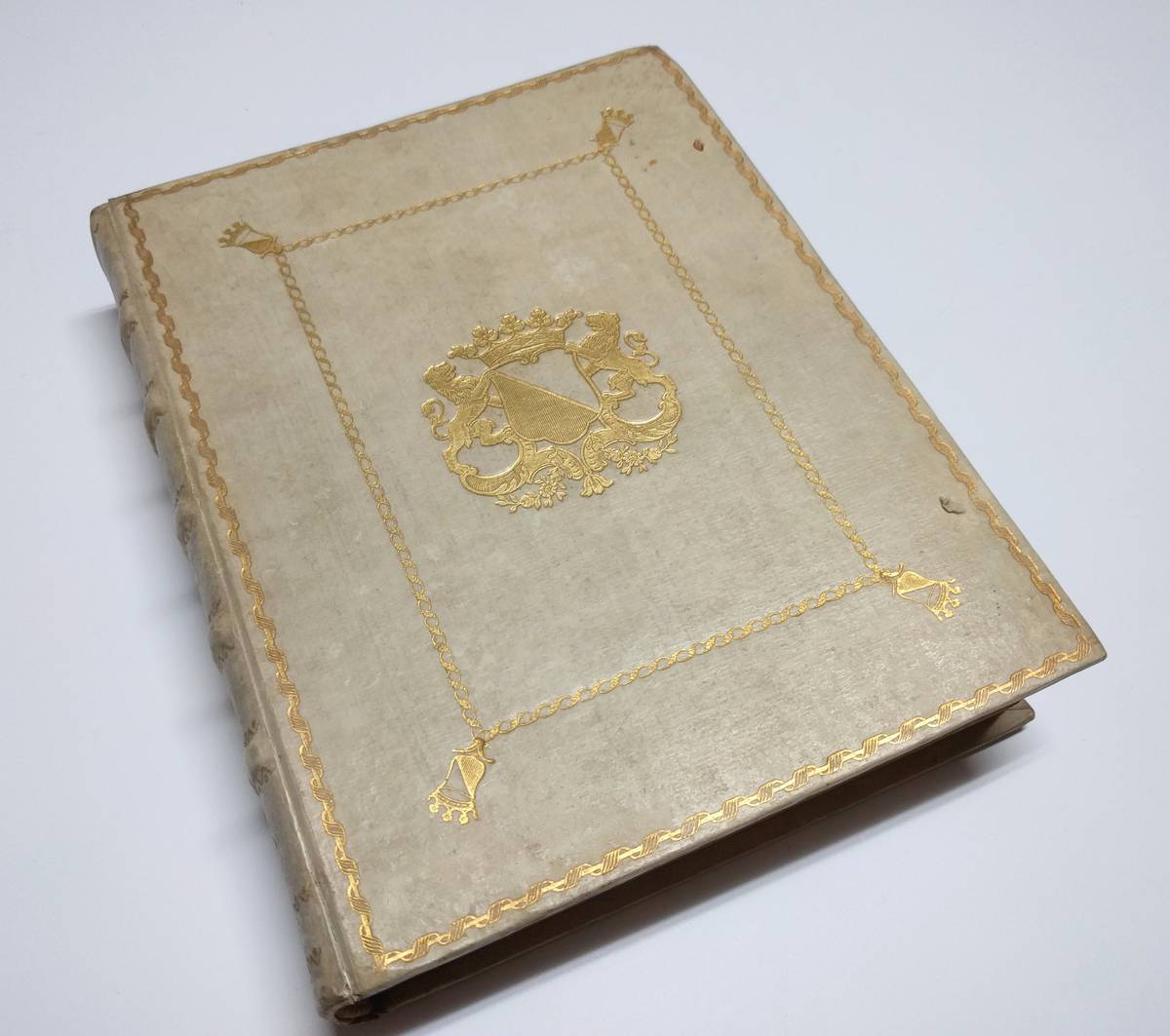EURIPIDES.
EURIPIDOU HIPPOLUTOS. Euripidis tragoedia Hippolytus, quam, Latino carmine conversam a Georgio Ratallero, adnotationibus instruxit Ludov. Casp. Valckenaer. (Bound with:) Lud. Casp. Valckenari Diatribe in Euripidis perditorum dramatum reliquias.
Leiden (Lugduni Batavorum), Apud Ioann. Luzac & Ioann. Le Mair, 1767 - 1768.
4to. 2 volumes in 1: XXVIII,322,(XVIII);VIII,312 p. Vellum 26 cm (
Ref: Hoffmann 2,78; Moss 1,425: 'A very elegant and excellent edition, containing a very correct text'; Dibdin 1,548/49: 'It is a perfect specimen of careful research, acute emendation, and copious illustration'; Brunet 2,1104: 'Édition très recherchée'; Graesse 2,522; Ebert 7107; Spoelder p. 684, Utrecht 4; Ad 1: STCN 238032841; Ad 2: STCN 23803271X; Hoffmann 2,97) (
Details: Prize copy Utrecht, without the prize. Back gilt and with 5 raised bands. Boards with gilt borders and the gilt coat of arms of Utrecht, within a gilt rectangle) (
Condition: Vellum very slightly soiled. The prize has been removed. All 4 decorative fastening ribbons gone. Front starting to split only at the foot of the spine, for a few centimeters. Nice, clean copy) (
Note: 'With Sophokles Greek tragedy reaches its culmination. Euripides, great poet though he was, represents the first symptom of the inevitable decline, for in him we can recognize a certain impatience with the form he found ready to his hand'. This is how H.J. Rose started his chapter on Greek the tragedian Euripides, ca. 480-406 B.C., some 80 years ago. (H.J. Rose, 'A history of Greek literature', 4th ed., London 1965, p. 177, first published in 1934) That opinion has now been superseded. Euripides' play 'The Bacchae', which drew little attention before 1900, 'has come to seem one of the defining models of Greek tragedy and even of tragedy itself, rivalling Aeschylus' Oresteia and Sophocles' Oedipus Tyrannus and Antigone'. (The Classical Tradition, Cambridge Mass. 2010, p. 347) For this, Euripides has to thank the German philosopher Friedrich Nietzsche. The upsurge was caused by his 'Die Geburt der Tragödie aus dem Geiste der Musik' (1872) in which he drew attention to the idea of 'the Dionysiac', a key element in the Bacchae. This idea 'has had a massive influence not only on understandings of tragedy, but on theories of theatrical performances itself'. (Idem, ibidem)
§ The Frisian scholar Lodewijk Caspar Valckenaer, latinized Ludovicus Casparus Valckenarius, 1715-1785, who produced this Hippolytus edition, was a pupil of Tiberius Hemsterhuis, a Frisian too, and after him the greatest Dutch classical scholar of the 18th century. Hemsterhuis was professor of Greek at the University of Franeker from 1717 till 1740, and from 1740 till 1765 at the University of Leiden. Hemsterhuis was the founder of a Dutch school of criticism, the so-called 'Schola Hemsterhusiana', which had in Valckenaer its best known disciple. Valckenaer studied Greek in Franeker under Hemsterhuis, and succeeded to his chair in 1741. In 1765 he left for Leiden, once again as successor of his beloved teacher. Both created a golden age of Greek studies in the Netherlands. Still a student he edited a Greek lexicon of the grammarian Ammonius, 'De adfinium vocabulorum Differentia', Leiden 1739. In Franeker he produced a revised and augmented edition of Fulvio Orsini's 'Virgilius illustratus', Leeuwarden 1747. This title is important for the history of scholarship for its inclusion of the text of the 22nd book of the Iliad of Homer, accompanied by an introduction, 'variae lectiones' and the 'editio princeps' of scholia of Porphyrius and other hellenistic and byzantine scholars. In 1755 Valckenaer published an edition of Euripides' 'Phoenissae', with his rich commentary, and a Latin translation by Hugo Grotius. Among his best works are two other Euripides editions, this Hippolytus edition of 1768 and his 'Diatribe in Euripidis perditorum dramatum reliquias' of 1767. Valckenaer also produced editions of the Idylls of Theocritus, Leiden 1773, and of the complete works of bucolic poets Theocritus, Bion and Moschus, Leiden & Kampen 1779. His Callimachus was published posthumously by J. Luzac in Leiden in 1799.
§ In the introduction to the Hippolytus edition Valckenaer follows the opinion of Longinus who thought that Euripides was not inferior to Sophocles, and that he had been 'felicissimus', in the poetic expression of the 'mentis concitatae pertubationis, furore atque amore'. (Praefatio p. IX) Valckenaer's notes are not printed below the text, but fill the pages 159-322. Valckenaer's Hippolytus edition is usually accompanied by his 'Diatribe in Euripidis perditorum dramatum reliquias', which was published one year earlier, 1767. In it Valckenaer discusses the fragments of the lost plays of Euripides. This treasure of erudition, found in the Hippolytus and the Diatribe, and in the Phoenissae, contributed decisivily to attract the attention of scholarship to Euripides. Valckenaer is considered one of the best commentators of Euripides) (
Collation: Ad 1: *-3*4, 4*2; A-T4, V-X2, Y-2V4, 2X2. Ad 2: *4, A-2Q4) ( Photographs on request)
Book number: 140001 Euro 290.00
Keywords: (Oude Druk), (Rare Books), Dutch imprints, Euripides, Greek literature, Greek text, Griechische Literatur, Hippolytos, Hippolytus, Latin translation, Prize copy, Prize copy Utrecht, Tragödie, antike altertum antiquity, tragedy
 EURIPIDES.
EURIPIDES.

